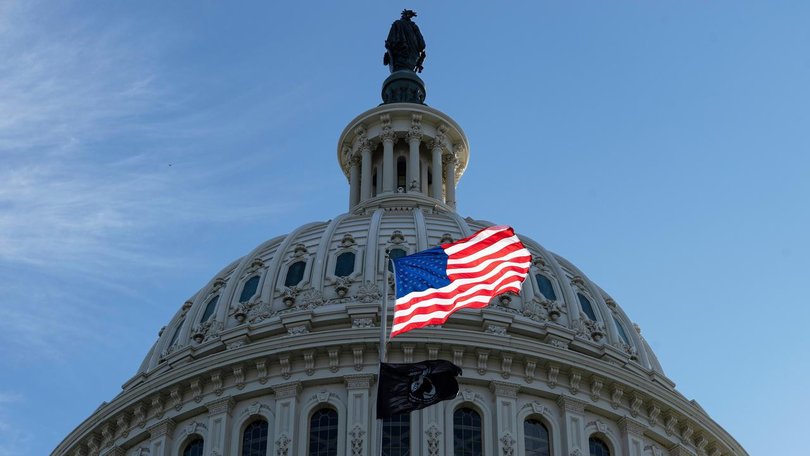US shutdown: Trump blinks, saying for first time he’s willing to negotiate with Democrats
President Trump said he was open to meeting with Democrats to end the impasse. Senator Chuck Schumer, the minority leader, denied any talks were underway.

President Donald Trump suggested Monday he was open to a deal with Democrats who have sought the extension of Affordable Care Act subsidies as a condition of ending the government shutdown, the first indication that Mr Trump was willing to negotiate rather than continuing to insist that Democrats must first reopen the government.
Speaking in the Oval Office to reporters, Mr Trump said he was willing to make “the right deal,” adding that “we’re talking to the Democrats.” Senator Chuck Schumer, the minority leader, quickly denied that any talks were underway, but said Democrats were ready to negotiate as long as the health insurance subsidies could be renewed.
“Trump’s claim isn’t true — but if he’s finally ready to work with Democrats, we’ll be at the table,” Senator Schumer of New York said in a statement. “For months, Democrats have been calling on Donald Trump and congressional Republicans to come to the table and work with us to deliver lower costs and better health care for the American people. If President Trump and Republicans are finally ready to sit down and get something done in health care for American families, Democrats will be there — ready to make it happen.”
Sign up to The Nightly's newsletters.
Get the first look at the digital newspaper, curated daily stories and breaking headlines delivered to your inbox.
By continuing you agree to our Terms and Privacy Policy.Senator Schumer’s strategy has been one of waiting for Mr Trump to blink, betting that the President would rather restore some or all of the insurance subsidies than take the blame for the effects of the shutdown, from flight delays to military and government officials missing their paychecks. But in this case, it is possible that Mr Trump was imagining a future negotiation rather than describing a current one.
Senate Republicans, led by John Thune of South Dakota, the majority leader, have taken the position that they are willing to discuss an extension of the health care subsidies only after the Democrats have allowed the government to reopen.
Mr Trump often exaggerates how much progress he is making in negotiations — as was evident when he said he had made significant progress on ending the war in Ukraine after he met President Vladimir Putin of Russia in Anchorage, Alaska, in August. But the White House’s refusal to say much in recent days to counter Democrats who charged that health insurance premiums would skyrocket if the government subsidies were not extended was an indication that officials were worried about the political impact of a big jump in premiums.
When Mr Trump finally addressed the issue Monday — the sixth day of the shutdown — his comments were vague. “We can have a much better health care than we have right now,” he said, repeating a line he used often in his first term and in his run for the presidency last year. But he gave no details and would not say who, exactly, he was talking to.
The Senate, meanwhile, voted for a fifth time to block two competing efforts to reopen the government, with Republicans and Democrats dug in.
No senators changed their position from previous roll call votes to end the shutdown, and party leaders insisted that they would continue to reject the others’ demands.
Since the government shut down last week, Democrats and Republicans have been seeking to blame one another for the legislative deadlock. Just before Mr Trump spoke, his press secretary, Karoline Leavitt, said the White House was looking only for a “clean bill” — that is, a bill with no amendments that simply allows the government to keep borrowing, and operating.
But the subsidies for those buying Obamacare, as the Affordable Care Act is known, would expire at the end of the year. Many Republicans want to let those subsidies die a natural death; Democrats have long bet that once the subsidies were in place, it would be difficult for Republicans to let them wither away.
This article originally appeared in The New York Times.
© 2025 The New York Times Company
Originally published on The New York Times
